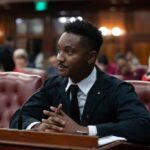

A federal judge handed a small favor to a conservative group investigating how Prince Harry was given a visa to enter the United States despite his admitted drug use.
A judge for the U.S. District Court for the District of Columbia said on Tuesday the Department of Homeland Security must fully respond to a request by the Heritage Foundation for records related to Harry being granted a visa despite his open admittance of federally restricted drugs, including marijuana, cocaine, and psilocybin.
THE FIGHTS THAT LAY AHEAD IN CONGRESS WITH DEBT CEILING IN REARVIEW
“There are three DHS components that have actually acted on the request and then another DHS component that both has not yet acted on the request and has not been willing to grant expedition,” Judge Carl Nichols, an appointee of former President Donald Trump, said during a Tuesday afternoon hearing.
“If we could get that other component to the point of the other three, we would actually advance this case to actually litigating whether and [to] what extent Heritage is entitled to the records it seeks.”
Nichols asked DHS attorney John Bardo to have the agency respond to the expedition request in the fourth component, as already completed in the previous three.
The judge’s order on Tuesday was not to compel the DHS to turn over the documents to Heritage but to offer a procedural response to the request. Once that is cleared, the judge would examine the merits of the case.
Nichols asked for the response by June 13, and from there, he would issue a motion on how the case should proceed going forward.
At the start of the hearing, an attorney representing the Heritage Foundation, Samuel Dewey, told the judge the core of the case is “whether DHS complied with the law.”
Heritage Foundation is seeking to “compel the production of information” related to DHS’s decision to admit the Duke of Sussex into the United States “and to allow him to remain to date.”
“A person’s visa … is confidential,” Bardo said Tuesday during the hearing.
While Bardo shelved the “public interest” into Harry’s past drug use as a matter largely pertinent to British “tabloids,” Dewey sought to convince the judge that past case law precedent pertaining to successful Freedom of Information Act requests does not include specifications that media must be based in the U.S., rather, that plain media intrigue was enough to constitute public interest.
“The [DHS] regulation says ‘media.’ It doesn’t say ‘American media’ or ‘mainstream media,'” Dewey told Nichols, later mentioning a report from the Daily Mail that cited attorneys warning Harry’s past drug use could jeopardize his visa status.
Dewey also said the privacy aspect of the DHS’s arguments has been “extraordinarily diminished” given his public remarks on his past drug use.
In his memoir Spare, released in January, Harry admits to his past use of marijuana, cocaine, and psychedelic mushrooms.
The admission is significant because past drug use may be considered grounds to deny a U.S. visa application, according to the lawsuit brought by the Heritage Foundation.
Harry, his wife, and their son Archie left the United Kingdom in 2020 after “stepping back” from life as working royals and settled in Santa Barbara, California. It’s not clear what type of visa Harry is on, and Meghan is a U.S. citizen.
The federal government, in its response to the lawsuit, questions its merits and suggests plaintiffs have not demonstrated irreparable harm in seeking a mandatory injunction by the judge.
U.S. Customs and Border Protection previously denied the plaintiffs’ request for records because “plaintiffs did not provide written authorization from the Duke of Sussex indicating that the Duke of Sussex consented to his information being released to plaintiffs.”
Dewey said at the start of the hearing that plaintiffs are withdrawing their motion pertaining to CBP.
Bardo indicated the DHS’s response would come via an email to the court clerk.
CLICK HERE TO READ MORE FROM THE WASHINGTON EXAMINER
The hearing in Washington, D.C., on Tuesday did not involve Harry specifically or any attorneys related to the duke.
Across the pond, a seven-week trial is underway on London’s High Court over Harry’s allegations that the Daily Mirror engaged in unlawful techniques to gain scoops on the British royal family.





